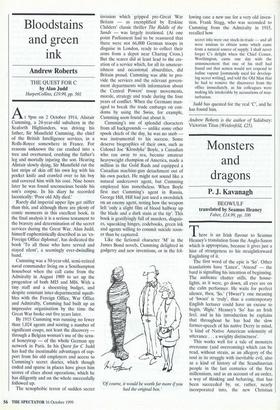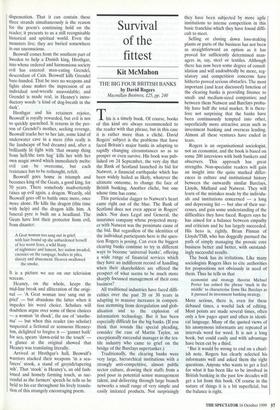Monsters and
dragons
P. J. Kavanagh
BEOWULF translated by Seamus Heaney Faber, £14.99, pp. 106
There is an Irish flavour to Seamus Heaney's translation from the Anglo-Saxon which is appropriate, because it gives just a hint of strangeness to his straightforward Englishing of it. The first word of the epic is 'So'. Other translations have 'Listen', 'Attend' — the bard is signalling his intention of beginning. The audience chatter stills, the house- lights, as it were, go down, all eyes are on the calm performer. He waits for perfect silence, then, 'So.' alwaet): one meaning of 'hwaet' is 'truly', thus a contemporary English lecturer could have an excuse to begin, 'Right.' Heaney's 'So' has an Irish feel, and in his introduction he explains that throughout he has had the slow farmer-speech of his native Derry in mind, 'a kind of Native American solemnity of utterance ... a weighty distinctness'. This works well for a tale of monsters overcome (and overcoming) which can be read, without strain, as an allegory of the soul in its struggle with inevitable evil, also as a kind of history of the Scandinavian people in the last centuries of the first millennium, and as an account of an order, a way of thinking and behaving, that has been succeeded by, or, rather, nearly incorporated into, the new Christian
dispensation. That it can contain these three strands simultaneously is the reason for the poem's continuing hold on the reader; it presents to us a still recognisable historical and spiritual world. Even the monsters live; they are buried somewhere in our unconscious.
Beowulf comes from the southern part of Sweden to help a Danish king, Hrothgar, into whose ordered and harmonious society evil has entered: man-eating Grendel, descendant of Cain. Beowulf kills Grendel bare-handed. That he uses no weapons and fights alone makes the impression of an individual soul-wrestle unavoidable; and Grendel is made real, in Heaney's intro- ductory words 'a kind of dog-breath in the dark'.
Hrothgar and his retainers rejoice, Beowulf is royally rewarded, but evil is not so quickly quenched. It returns in the per- son of Grendel's mother, seeking revenge. Beowulf tracks her to her lair, some kind of underwater cave in a mere (this really is the landscape of bad dreams) and, after a brilliantly lit fight with 'that swamp thing from hell/the tarn hag' kills her with her own magic sword which immediately melts: evil can be overcome, but each resistance has to be rethought, refelt.
Beowulf goes home in triumph and becomes king of the Geats, a good king, for 50 years. There somebody inadvertently raises up evil again, a dragon. Wearily, old Beowulf goes off to battle once more, once more alone. He kills the dragon (this time With help) and the dragon kills him. A funeral pyre is built on a headland. The Geats have lost their protector from evil, from disaster:
A Geat woman too sang out in grief; with hair bound up she unburdened herself of her worst fears, a wild litany of nightmare and lament, her nation invaded, enemies on the rampage, bodies in piles, slavery and abasement. Heaven swallowed the smoke.
It is a picture we see on our television screens.
Heaney, on the whole, keeps the mid-line break and alliteration of the origi- nal — 'A Geat woman too/ sang out in grief' — but abandons the latter when it impedes his word choice. Scholars will doubtless argue over some of these choices — a woman 'in shock', the use of 'anathe- ma' — but when this reader (no scholar) suspected a fictional or sensuous Heaney- ism, delighted to forgive it — 'gannet bath' for sea, spears 'dawn-cold to the touch' — a glance at the original showed that Heaney was translating literally.
Arrived at Hrothgar's hall, Beowulf's warriors stacked their weapons 'in a sea- farers' stook, a stand of greyish/tapering ash'. That 'stook' is Heaney's, an old fash- ioned and homely farming touch, as suc- cessful as the farmers' speech he tells us he held to his ear throughout his lively transla- tion of this strangely encouraging poem.



















































































 Previous page
Previous page